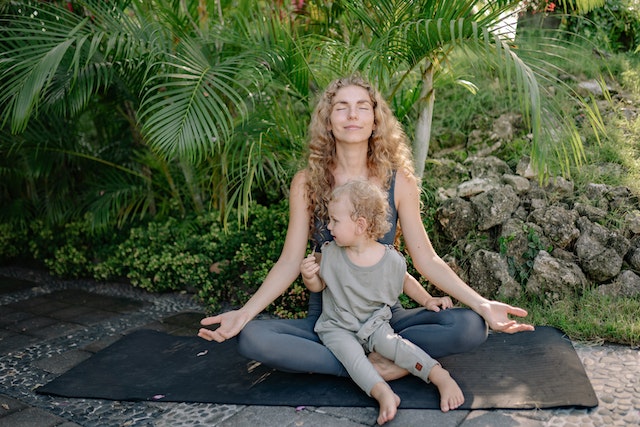 Sale Ends 04 Nov, 20-50% OFF + Free Shipping
Sale Ends 04 Nov, 20-50% OFF + Free Shipping Sale Ends 04 Nov, 20-50% OFF + Free Shipping
Sale Ends 04 Nov, 20-50% OFF + Free Shipping
Studying the impact of varied parenting styles on child development, especially mindful parenting, is crucial. Different ways that parents interact with their children can significantly affect the kids as they grow. Analyzing these effects helps us learn how to raise children better, promoting their overall development – be it emotional, social, or cognitive.
Mindful parenting is an approach that involves being present and paying attention to your little one’s needs. This style requires parents to show kindness and understanding, leading to a more peaceful and respectful relationship with their child.
The mindfulness-based approach revolves around five essential elements. First is listening with full attention. This means focusing on your kid’s words without distractions. Second is non-judgmental acceptance, treating your kid’s feelings and thoughts as significant. The third element is emotional awareness of self and child, where you become sensitive to your own and your child’s feelings. Fourth is self-regulation in the parenting relationship, learning to manage your emotions while dealing with your child. Lastly, compassion for self and child emphasizes understanding and kindness towards both you and your kid’s experiences.
In contrast to the traditional approach to parenting parenting, which focuses on the disciplinarian role or the nurturing role, mindful parenting fosters openness and communication rather than unilateral decision-making. So, instead of commanding ‘do as I say,’ mindful parenting encourages parents to listen, understand, and then guide their children.

From universities to independent research bodies, there’s an abundance of studies illuminating this beneficial style of parenting.
One paper of note comes from scholars at the University of Vermont. They discovered a strong link between this mindful approach and healthier mental states in children. In fact, their study results indicate lower rates of anxiety and depression in kids raised with mindful parenting methods.
Another pivotal study hailing from the University of Amsterdam shows the creation of stronger parent-child relationships when mindfulness is practiced. These relationships tend to have more trust, respect, and open communication.
Then there’s compelling research out of Ohio State University. The research team found evidence of improved parent-child interaction. Particularly, children showed enhanced social skills while their parents felt less stressed and more capable in their parenting roles, all thanks to the use of mindfulness.
These scholarly efforts, among others, shed light on the real, measurable effects that mindful parenting can have on a kid’s development and familial relationships. The findings confirm that being present and focused as a parent isn’t just a “nice-to-have”, it’s quite possibly a game changer in raising well-adjusted, happy, and resilient kids.
Start your day by taking a few minutes to focus on your breath — it helps to center your thoughts. Make it a habit to take a mindful walk, focusing on each step and the sensation of movement. While doing chores, try to stay engaged and present, bringing awareness to every motion.
When faced with a difficult moment, take a deep breath. Instead of reacting instantly, give yourself a moment to pause and think. You can also apply this to interactions with your child. If they are upset or misbehaving, rather than reacting in anger, pause, consider their feelings, and respond with calm understanding.
Give your child full attention and show empathy towards their feelings. Express your own feelings and needs openly and respectfully as well. On the other hand, stress is a common part of parenting, but mindful techniques can help manage this. Regular meditation, yoga, or simple deep-breathing exercises can provide relief from stress and promote mental peace.
Just like any other parenting style, mindful parenting also faces its share of criticisms. Some argue that mindful parenting requires too much effort and can put unnecessary stress on the parent. A common complaint is that it tends to focus more on parents’ needs and feelings rather than those of their children. Yet proponents argue by prioritizing their well-being, parents are better able to support their children emotionally and psychologically.
Practicing mindfulness can pose its own unique set of hurdles. One of the big ones is struggling to find enough time in the day to incorporate mindfulness practices. Parents often have so many responsibilities that it can be burdensome to carve out the time for self-reflection and awareness. Another hurdle is the misconception that being mindful means being a “perfect” parent. This can lead to undue guilt if parents feel they aren’t living up to the mindful parenting ideal. It’s important to remember though, that being mindful doesn’t mean being flawless. It’s about witnessing one’s own habits, becoming aware of them, and using this awareness to support the growing connection with children.
Summing up, mindful parenting could reshape traditional parenting tactics. It stands a chance of promoting healthier development and strong relationships with your child. Furthermore, mindful parenting may present an effective way to deal with the pressures of parenting. Despite possible challenges, the potential benefits are too great to ignore, making this approach worth considering for any parent or caregiver.
Mindful parenting can have a positive effect on a kid’s behavior by providing them with a supportive and nurturing environment, promoting self-regulation, and strengthening the parent-child bond.
Mindful parenting is different from other parenting practices because it is based on mindfulness, which is a moment-to-moment awareness of what is happening in the present moment. Other parenting styles may focus more on control or discipline.
Parents can practice the mindful approach to parenting by learning and implementing mindfulness techniques such as meditation, deep breathing, and being aware of their own emotions and reactions.
Mindful parenting can help parents navigate stressful situations by allowing them to pause, reflect, and respond in a calm and thoughtful manner rather than reacting impulsively.
Yes, practicing this approach helps parents become more aware of their own thoughts, feelings, and reactions and can contribute to an overall increase in mindfulness.